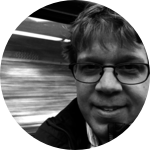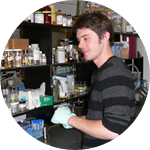About This Project
Our skin is a dynamic ecosystem for the bacteria, archaea and fungi that call it home. Cleaning products, textiles, and behaviors shape our skin microbiome, the composition of which may in turn feed back on our health and the health of those we interact with. We believe that changes in cleaning habits, or textiles can positively alter the microbial ecology of our skin.
Ask the Scientists
Join The DiscussionWhat is the context of this research?
Microbiome Background
It is estimated that bacterial cells in and on the human body outnumber our own. The composition of the commensal microbiome living on our skin may have dramatic impact on wound healing, immune system development, and protection from communicable diseases. However, these communities have been altered by modern practices. We are only in the beginning stages of understanding how modern lifestyles alter our microbiome, and how this might influence our health.
Cleaning Background
Before soap was commonly used, and specifically in ancient Greek and Roman era scented oils were rubbed onto the skin and scraped off with a tool known as a strigil. The oil scrapings of famous athletes was often collected and then sold to wealthy individuals who would anoint themselves with it.
What is the significance of this project?
As an applied research project that spans both biology and design, we can ask new and exciting questions aimed at how our microbial life changes given our behavior. We can also explore the esthetics of what people value in manipulating their microbiomes.
The outcome could lead to biological and/or medically relevant results, as well as introduce the design community to how we might shape our microbiomes through design.What are the goals of the project?
Our goal is to develop a unique data set that looks rigorously at the impacts of cleaning and textiles on the microbiome, as well as the behavioral design of transitioning to altered cleaning regimes.
We will test four areas of the body (feet, underarm, groin, torso) in triplicate over a time course across different hygiene treatment types. Each volunteer in the study will undergo pre- and post-study interviews and be required to keep a daily journal to capture their behavior and health status.
We will collect a valuable dataset that will improve our knowledge of how our skin microbiome interacts with our behavior, and how this influences our health and well-being.
Budget
As a biology & design firm, LikoLab exists to join together these fields in unique and valuable ways. In this experiment we are partnering with experts in the human microbiome, as well as experts in design thinking and application.
This type of joint experiment falls outside the normal bounds of funding, yet can propel both fields forward in unique and tantalizing ways. Including, allowing design insight into the value and potential of microbial research, enabling the design community to see the power of learning to work with our living microbial community, and creating opportunities for product development that improves human health.
Meet the Team
Team Bio
::TIMOTHY MCGEE::
is chief biologist and designer at LikoLab, a biology & design firm that learns from nature, and makes things.Tim's work spans broad challenges from developing new ways to manufacture materials to enabling healthcare companies to better understand how their data is relevant to commercial markets. Tim is also co-founder of Biomimicry New England, a non-profit that works to establish nature and natural systems as an important resource for education and innovation in New England.
Tim holds a BA in Biology from Colby College, and a MS in Biochemistry and Molecular Biology from the University of California Santa Barbara.
::SEAN GIBBONS::
is a microbial ecologist at the University of Chicago and a research associate at Argonne National Laboratory. He specializes in microbiology, systems ecology, and mathematical biology. He is interested in how simple interactions between microbes and their environments can give rise sophisticated emergent phenomena. In particular, his recent work has focused on the link between human health and the composition of the microbiome.
Sean has a M.S. degree in microbiology from Uppsala University in Sweden. He also holds bachelors degrees in molecular biology, microbiology, and French from the University of Montana. Sean is finishing his doctorate in biophysics at the University of Chicago, and has over twenty peer-reviewed research publications.
Timothy McGee
Chief Biologist and Designer at LikoLab.
Project Backers
- 23Backers
- 11%Funded
- $1,305Total Donations
- $56.74Average Donation

